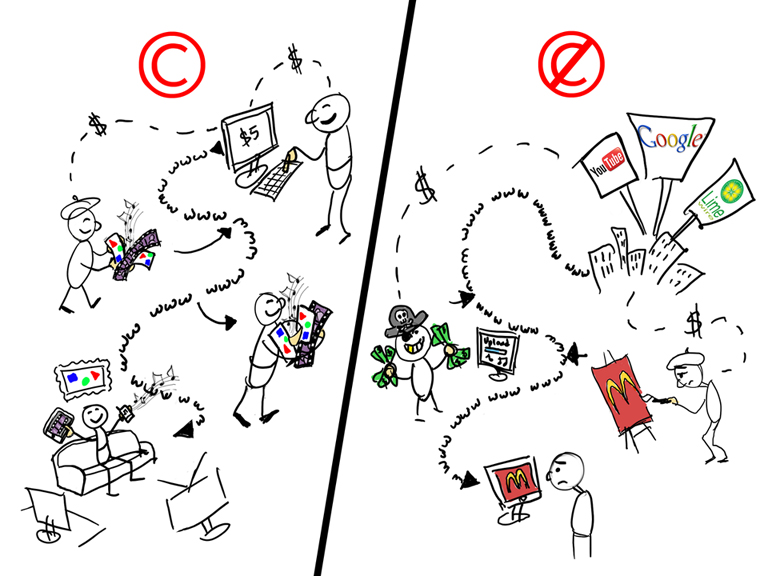
Everyone loves a utopia, right? Funny how those never quite work out in books, movies or reality (Brave New World, Pleasantville, Stalin's communal agriculture). In the end, we always go through a bunch of trouble just to figure out we had it pretty good the way it was to begin with. The Internet is our latest utopian fascination. We've discovered a technology that allows us to get whatever intellectual property we want at our fingertips without paying anyone for it, and it's fun and it's easy, and we wanna' do it -- it's like Christmas, look at all this cool stuff for free! Who wants to go and spoil the ride by admitting that it's not the least bit sustainable? So the new craze is 'free culture' The new utopian theory is about how the world would be a better place if we just invented new business models that make money from giving away all works of art and intellect on the Internet.
Well folks, I hate to be Debbie Downer, but the Internet hasn't really changed anything, at least not when it comes to how the business of art needs to work in order to sustain itself. Though it may be difficult for a lot of people to believe, as artists we have to spend the majority of our time doing something that will make us the money to pay our bills, just like everyone else in the world. If we can't perfect our craft full-time, then we'll have to do it part-time (if we even have the energy to do it that much after working full-time at something else all day). As a result, there will be a whole lot less work to steal. Also, since we won't be spending the majority of our time honing our craft the work won't be as good.
- With no competition from piracy, the industry would be able to set a fair price, and find markets for all sorts of movies and songs that wouldn't have ever been created before, increasing the industry's productivity, and the quality of its product (currently competition from piracy is forcing the industry to narrow its focus to lowest common denominator music, and movies based on "proven winners" or properties that have already succeeded as books, etc, because the industry is desperate to turn a profit in the face of piracy).
- With no need to protect content by walling off the distribution method through the use of proprietary cables and formats, service providers could integrate their TV, movie, music, and Internet services so that consumers could instantly own a piece of content on all of their devices with the click of one button.
It's a win-win, both the industry and the consumer get real value from the Internet.
But the key word here is 'value', meaning not free, but well worth the price.
Now let's look at what would happen if the "free culture movement" succeeds in devaluing intellectual property to the point where no one can make a living in art.
- For a little while, everyone would be happy, gobbling up everything that already exists for free. A little instant gratification never hurt anyone, right? And besides, we don't have to worry about those nasty "consequences" until later. Say, this is starting to sound familiar... sub-prime loans anyone?
- Since there will continue to be a demand for new entertainment, and the entertainment industry will have been stripped of its ability to profit from doing good work (or creating better intellectual property, if you will) it will have to find some other way to profit from the content it creates. Who will the industry turn to? The same folks who are profiting from illegal downloading now -- the advertisers. (Google AdSense made2.06 billion last year, much of which came from ads on pirated movie and music sites). And once there's no longer any profit motive at all in making good entertainment, it'll start to get really ugly- the profit motive will turn from a 'good content = profit model' to a 'good for advertisers = profit model'.
I don't know about you, but I don't think I'd want to live in a world where every movie or song you see or hear HAS to sell you a product in order to be profitable -- yikes! That's not a utopia that's a dystopia! Let's stop being naïve about the Internet and hand the power over art back to the artists before it's too late! Yes, we might have to pay for our movies and music, but at least they won't sound like advertising jingles or look like product placement ads.